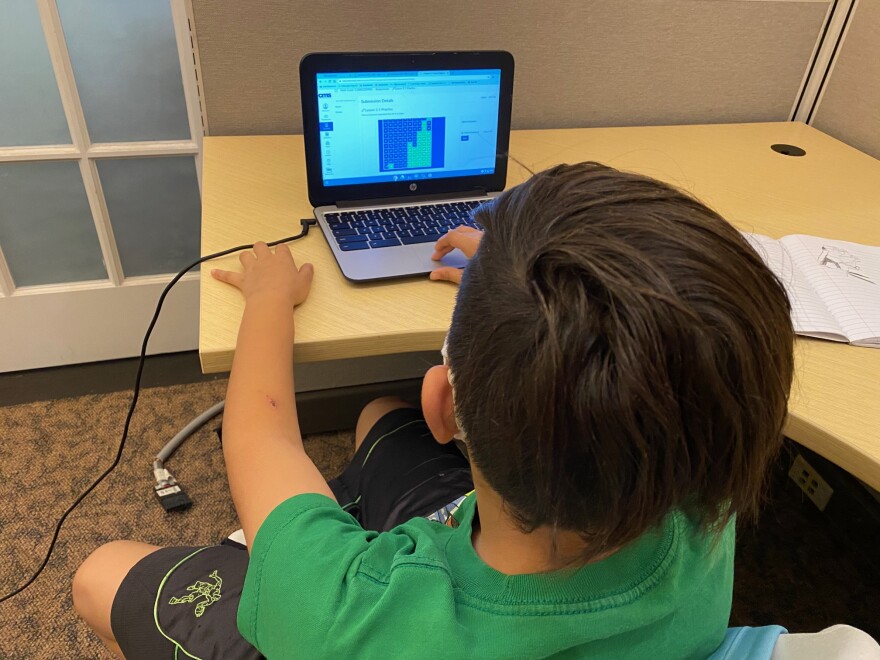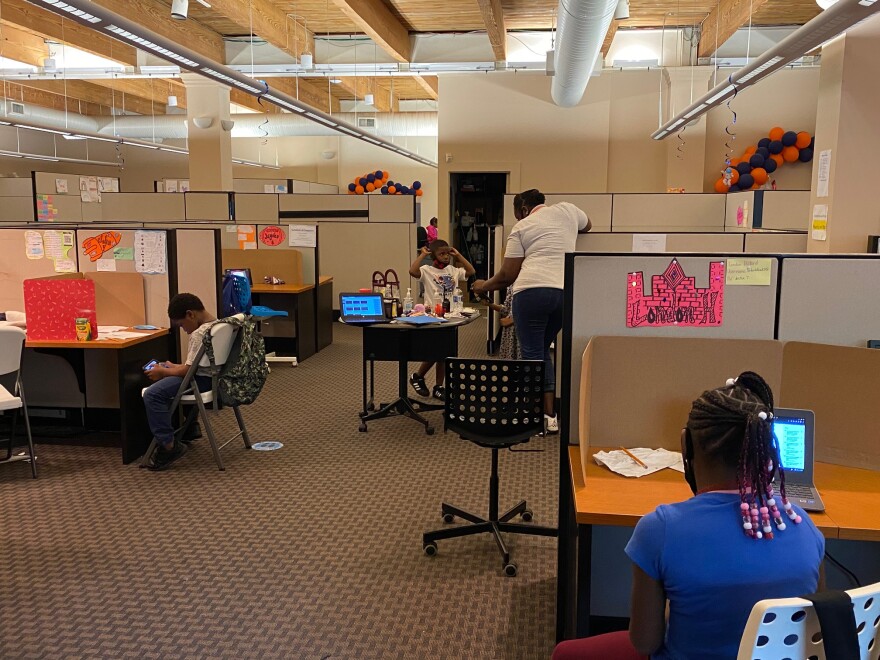Charlotte-Mecklenburg elementary students have been learning remotely since August, but about 100 of them ride a school bus every morning to a place that looks and sounds a lot like school.
The Steve Smith Family Foundation opened a virtual learning center in uptown Charlotte, in the shadow of the stadium where Smith built his career as a Panthers wide receiver. It provides a place for students to do their remote classes with tutors, includes tech support, free meals and other children.

Gerard Littlejohn, the foundation’s executive director, said these are K-5 students CMS has identified as most at risk during remote learning: "Kids who are living in shelters, living in hotels, or couch surfing, or living on the street, or living in tent city."
Like districts across America, CMS is trying to make sure all students can learn online when the coronavirus makes in-person learning unsafe. The district provides laptops or tablets for students to take home, and Wi-Fi hotspots for those who lack a reliable internet connection. But Littlejohn said young children also need adult help.
"It’s great that every kid got a laptop and it’s great that every kid got a hotspot," he said. "But what about the kids who are trying to connect and they’re with Grandma, and Grandma has no idea what Zoom or Canvas is?"
CMS now has partnerships with 29 remote learning sites across the county. But the back story to the Steve Smith Family Foundation stands out.
A Clash Turns Into A Partnership
The foundation was already working to promote family health and help domestic violence survivors, so Littlejohn says when the pandemic struck it was natural to think about supporting children who don’t have stable housing.
The foundation partnered with OASIS, a tutoring program that had created a small remote learning center for children at the Harvest Center homeless shelter near the airport. The groups found the uptown location and pitched the plan to CMS.
As classes began Aug. 17, Smith did an interview with WCNC blasting CMS for not offering enough support. He said the district had only offered funding to provide remote learning for 35 homeless students.
"These kids now wake up every day going, 'Am I important?' And the answer that I believe CMS is giving them is no, they aren’t," Smith said.
Four days later, Superintendent Earnest Winston made an announcement at a virtual news conference, where he thanked the foundation for calling attention to the problem: "CMS is contributing $116,000 that will provide 100 children the opportunity to receive eight weeks of virtual learning assistance, technology, school supplies, meals and more offerings through the foundation."
Donations And Contracts
That support came in the form of a charitable donation, not a contract, according to CMS Chief of Staff LaTarzja Henry. It’s an unusual move, she said, but the mission was important and CMS had money available from interest received from other accounts.
"This is not a practice that we’ve done in the past," she said Tuesday, "but obviously given the times that we’re in, wanted to definitely do something that we thought made sense for kids."
After that donation, the state revised its rules to allow districts to form partnerships with other organizations to create remote learning centers. CMS did sign contracts with the other hosts, which include the YMCA, municipal governments, churches … even a martial arts studio and a retirement community.
Connecting Lost Students

The Steve Smith Family Foundation center opened Aug. 31, two weeks after classes began. When the first 50 children arrived, the staff asked about their experience with remote learning so far. Almost half of them hadn’t logged on at all since the school year ended in June — and Littlejohn said some had been disconnected since schools closed in March.
"So they had gone the entire summer pretty much 'Zero Dark Thirty' — had not logged on, were being counted absent," he said. "And since then, we have quite a few students who have perfect attendance."
At the center, which is free to families, children work from cubicles that are laid out for social distancing. Sometimes they work alone, with an online link to their class or using computer programs.
Sometimes they work with OASIS tutors. The tutors work with CMS teachers to know what help each child needs. Littlejohn said tutoring software shows if the kids have made progress in reading and math.

There’s even some of the social experience of a classroom. Last week, a group of kindergarteners and first-graders sat on the floor singing songs about the days of the week and months in a year, led by tutor Sandy Hall.
"I think it’s important for them to come together, not just stay at their desk, and work on things together — just to create more like a classroom setting for them so that they understand what’s required in a classroom, not just virtual learning," Hall said.
The children were sitting shoulder-to-shoulder with their faces uncovered as they sang. When they return to in-person classes Nov. 2, CMS will expect them to keep their masks on. Littlejohn said the remote learning staff tries, "but it is tough — they’re kids, right? So it’s hard to enforce as much as you can."
There have been no COVID-19 cases at the center, he said.
Plans To Keep Going
The foundation has money to keep the center going through the end of the school year. Even after students return to class two days a week, they’ll still be in remote learning the other three days.
Littlejohn said it’s important to keep providing support "instead of them going back to a shelter, going back to a hotel and largely being sometimes by themselves, sometimes with parents or grandparents that just don’t understand the technology and understand what’s going on."
With all of the remote learning centers that are approved or in the works, about 2,200 CMS students will have a place to go, Henry says.
But most of those slots are at centers that charge fees. And CMS has an estimated 4,000 homeless students.
Littlejohn said it’s great to help 100 of them, "but in the overall huge bucket of kids and families that are out here, we’re not really scratching the surface."
Henry said regardless of how the pandemic plays out in the coming weeks, there's going to be a need for groups and individuals willing to step up and help the district's most fragile students.
Sign up here for The Frequency, WFAE’s daily email newsletter.
What questions do you have about the coronavirus? What has this experience been like for you? Share your questions below.
_





